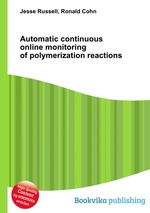Automatic continuous online monitoring of polymerization reactions
Jesse Russell Ronald Cohn
бумажная книга
High Quality Content by WIKIPEDIA articles! Automatic continuous online monitoring of polymerization reactions (ACOMP) was developed at Tulane University by Prof. Reed in 1998, with the first publication appearing in 1998. Polymerization reactions are difficult to monitor in real-time, so characteristics and properties of the polymers aren`t known, oftentimes, until after the reaction is already complete. ACOMP monitors these reactions in real-time by automatically and continuously diluting small streams of polymer out of the reactor and then running the sample though widely accepted detectors such as Refractive Index, Light Scattering, and Intrinsic Viscosity to completely characterize the polymer as it is being "born." ACOMP can be used as an analytical method in R&D, as a tool for reaction optimization at the bench and pilot plant level and, eventually, for feedback control of full-scale reactors. ACOMP measures in a model-independent fashion the evolution of average molar mass and intrinsic viscosity, monomer conversion kinetics and, in the case of copolymers, also the average composition drift and distribution. ACOMP is applicable in the areas of free radical and controlled radical homo- and copolymerization, polyelectrolyte synthesis, heterogeneous phase reactions, including emulsion polymerization, adaptation to batch and continuous reactors, and modifications of polymers.


